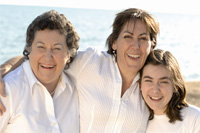Endometriosis Awareness Week

Endometriosis Awareness Week
Teenage girls with endometriosis are not diagnosed early enough and are too often left trying to manage the painful, sometimes debilitating symptoms without support.
March 5th to 11th 2012 is endometriosis awareness week, and Jean Hailes for Women's Health wants to tell adolescent girls that severe period pain is not normal - it should be investigated by a GP or gynaecologist, and endometriosis should be considered as a possible diagnosis.
"We've always believed that endometriosis occurs later on in life, and that adolescents just don't get it, but they do," says Dr Elizabeth Farrell, gynaecologist and Acting Medical Director at Jean Hailes. "Some girls are living with severe period pain that affects their ability to function day to day. They have to take time off school or work and are told, or just believe, that severe period pain is just part of being a woman. It isn't."
Endometriosis affects about 1 in 10 Australian women: Endometrial tissue, which normally lines the uterus, grows outside the uterus and attaches to the ovaries, the lining of the pelvis and sometimes the uterus, bowel or bladder. This misplaced tissue can bleed onto surrounding tissues and cause irritation, inflammation and scarring. Symptoms include heavy and prolonged bleeding, severe period or abdominal pain, pain during or after sex, tiredness, mood changes and bloating.
On average, it takes about seven years to diagnose endometriosis; but when it occurs in adolescence this can take even longer, allowing the disease to progress further and placing women's fertility at further risk.
Endometriosis in adolescents needs careful management to reduce future health complications, says Dr Farrell. The current gold standard for definitively diagnosing endometriosis is laparoscopy - keyhole surgery - but this should be delayed for as long as possible in younger women with suspected endometriosis.
"I would recommend trying hormonal suppression of the periods - such as prescribing the Pill - to dampen down the progress of what you think could be endometriosis, and avoid surgery until later," says Dr Farrell. "The aim is to manage symptoms, reducing pain and bleeding so the young woman can function normally. We may do that until the young woman is at the end of her school years and then, if symptoms are still there, that may be the better time to do a laparoscopy to confirm endometriosis."
For more information, visit www.endometriosis.org.au
Published with the permission of the Jean Hailes Foundation for Women's Health
Tollfree number 1800 151 441 for women seeking further health information www.JeanHailes.org.au
MORE
- Menstrual Period Management
- The Secret to Weight Loss
- Feeling The Pain: How To Tackle Period Pain
- Period Pain and How to Survive It
- Gender Specific Medicine
- Helping Women To Start Those 'Difficult'...
- Michelle Boyd Ellura Interview
- Menopause Does Not Protect Women From Cervical...
- Five Ways to Balance Hormones
- Do You Really Know What Is Going On Down There?
- Do You Know Your Breasts?
- Dr. Stan Goldstein Sexual Health Choices Interview
- Breast Health Decision Question and Answers
- Breast Cancer Treatment Impacts Patients' Sex...
- Bladder Weakness More Common Than Hay Fever
- Belinda Reynolds How To Manage UTI's Naturally...
- Treat Bones Like Breasts
- Mammogram Technology
- Soodox for Women
- Chlamydia Most Commonly Reported STI In Australia
- Time For Reflection Is Great For Mental Health



